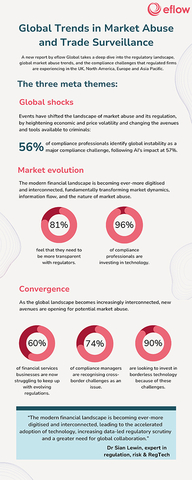eflow Launches Global Trends in Market Abuse and Trade Surveillance Report as 60% of Financial Firms Report That They Struggle to Keep up With Regulatory Changes
eflow Launches Global Trends in Market Abuse and Trade Surveillance Report as 60% of Financial Firms Report That They Struggle to Keep up With Regulatory Changes
- eflow Global’s new report offers a unique deep dive into historic market abuse enforcement, and reveals current and future challenges facing regulated firms and regulatory bodies
- Quantitative research shows that 74% of firms struggle with cross-border compliance, and AI and global instability threaten a new wave of criminal and compliance issues
LONDON--(BUSINESS WIRE)--UK-based RegTech (Regulatory Technology) scaleup eflow Global today launches an extensive research-based report exploring the regulatory landscape, global market abuse trends, and the compliance challenges that regulated firms are experiencing across global markets.
The Global Trends in Market Abuse and Trade Surveillance report includes new research gathered from 250 senior compliance professionals operating in the sector. The in depth report was commissioned by eflow alongside leading regulatory research experts and details the pressures faced by regulated firms in UK, North America, Europe and Asia Pacific. Three meta themes arise from the study: global shocks, market evolution and convergence.
Global shocks
The market is in the wake of a series of global shocks - including the pandemic, supply chain crises, geopolitical conflicts, an inflation emergency, banking market upheavals, and events involving artificial intelligence (AI) and digital assets. While all of these events are shifting the landscape of market abuse and regulation, global instability (56%) was cited as the second most likely cause of compliance issues in the next 12 months, after the use of AI (57%).
Convergence challenges
As the global landscape becomes increasingly interconnected, it also opens new avenues for market abuse. This interconnectivity enables perpetrators to exploit regulatory gaps and unmonitored spaces, previously beyond the reach of traditional surveillance and regulations. The survey revealed that 60% of financial services businesses are now struggling to keep up with evolving regulations. On top of this, cross-border challenges are clear, with 74% of compliance managers recognising them as an issue and 90% now looking to invest in borderless technology to help combat this.
Ben Parker, CEO and Founder of eflow Global, commented: “In recent years, the financial sector has undergone significant transformation, necessitating the adoption of innovative tools by businesses to address them. Central to these changes is the role of technology. On one hand, bad actors are exploiting technological advancements to bypass regulatory measures, while on the other, regulatory bodies are leveraging technology to uphold industry stability. Within this dynamic landscape, businesses need to equip themselves with the most effective tools to remain compliant.”
Dr Sian Lewin, expert in regulation, risk & RegTech, said: “The modern financial landscape is becoming ever-more digitised and interconnected, leading to the accelerated adoption of technology, increasing data-led regulatory scrutiny and a greater need for global collaboration. This has fundamentally transformed market dynamics, information flow, and the nature of market abuse. This intricate web demands a re-evaluation of how participants engage and combat misconduct.”
Market evolution
When it comes to tackling future compliance issues, the research revealed that almost all (96%) of compliance professionals plan to invest in technology. In an ever-more digitised and interconnected landscape, spanning global trading platforms to the role of ‘influencers’ operating on social media, regulatory pressure is rising, with 81% of financial firms feeling that they need to be more transparent with regulators.
NOTES TO EDITORS
About eflow Global
Founded in 2004, eflow Global provides financial firms with technology solutions to help them comply with their regulatory requirements in a more streamlined, efficient and robust way. It offers award-winning solutions for market abuse surveillance, best execution, transaction-cost analysis, transaction reporting and eComms surveillance. The company currently services over 100 clients across five continents, providing both buy-side and sell-side firms with highly configurable digital tools that are designed to keep them compliant and competitive in this ever-changing regulatory landscape. eflow’s regulatory solutions are delivered through a PATH, a unique digital ecosystem that offers the speed, convenience and efficiency of off-the-shelf software, combined with a level of customisation that is typically only associated with a bespoke platform.
Contacts
Rosie Lane
rlane@thecommsco.com
+44 7770 239888

